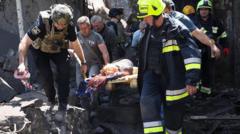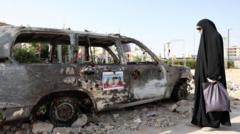Residents of Beersheba describe their terrifying experience during a missile strike that claimed several lives, leaving the community grappling with fear, loss, and the uncertainty of ongoing conflict despite a ceasefire agreement.
Chilling Moments in Beersheba: Residents Reflect After Devastating Missile Strike

Chilling Moments in Beersheba: Residents Reflect After Devastating Missile Strike
A recent missile attack in the Israeli city of Beersheba left residents shaken and questioning the future of a fragile ceasefire with Iran.
Early Tuesday morning, the southern Israeli city of Beersheba experienced a jarring missile attack, just hours before a fragile ceasefire between Iran and Israel was expected to take effect. As alarm notifications blared through their phones, residents were thrust into a state of panic, leading many to take refuge in reinforced safe rooms designed for protection against such assaults.
For Merav Manay and her family, the intensity of the blast was overwhelming. "It was so strong that we thought it was the end," she recounted, still reeling from the aftermath. After the dust settled, they emerged to find shattered windows littering their flat, but miraculously, they were unharmed. Tragically, however, nearby, another apartment block was not so fortunate; it sustained a direct hit, resulting in four fatalities.
Amidst the chaos, Israeli military and medical teams rushed to provide assistance to survivors while local volunteers began the daunting task of clearing debris from the streets. As they sought to make sense of the devastation around them, community members began expressing their hopes for peace. “I hope this is the end,” one resident lamented, grappling with the profound impact on their lives.
Both Israel and Iran acknowledged the ceasefire agreement but simultaneously accused one another of violating it, casting doubt on the stability of peace in the region. Standing amidst the wreckage left by the missile strike, Oren Cohen, a father of three, echoed the shared anxiety felt among other residents. “I was worried about my kids so only now am I starting to realize what happened here,” he admitted, visibly shaken.
Despite experiencing the terror firsthand, Oren voiced his support for Israel's military actions against Iran, believing it was a necessary response for their safety. “We do what we have to do to protect ourselves,” he stated. As the community began to come to terms with the violence, Merav expressed a resigned acceptance of the conflict, recognizing that such strikes were ultimately unavoidable.
With ongoing fears for their safety and the future of the ceasefire, Beersheba's residents find themselves at a crossroads, haunted by memories of violence yet yearning for a return to normalcy amidst the uncertainty of the geopolitical landscape.























